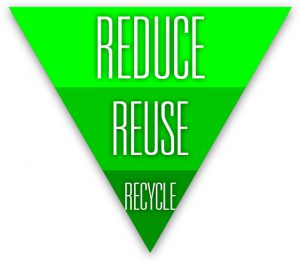

Rhodes Yepsen
BioCycle December 2019
In October, Greenpeace released a report entitled, “Throwing Away the Future: How Companies Still Have it Wrong on Plastic Solutions”. The report warns consumers “to be skeptical of the so-called solutions announced by multinational corporations to tackle the plastic pollution crisis. These false solutions, such as switching to paper or ‘bioplastics’ or embracing chemical recycling, are failing to move us away from single-use packaging and divert attention away from beneficial systems that prioritize refill and reuse.”
Greenpeace is calling attention to the fact that the plastic pollution crisis is driven by a cultural addiction to the convenience of single-use products and packaging. The report rightly highlights that reducing the volume of packaging and finding opportunities for reusables must be the top priority if we are going to have a meaningful solution.
The Biodegradable Products Institute (BPI) supports this waste hierarchy as well, commonly referred to as “the 3 R’s” — Reduce, Reuse, and then Recycle. And, we don’t see working with companies who make single-use products and packaging as contradictory to this framework. Rather, we believe our work is directly supportive of it.
 The reason that “Recycle” is one of the 3 R’s is that single-use packaging cannot be eliminated overnight. Recycling can be part of the broader solution, so long as we are actually keeping the material out of landfills and the environment, and getting it authentically recycled or composted.
The reason that “Recycle” is one of the 3 R’s is that single-use packaging cannot be eliminated overnight. Recycling can be part of the broader solution, so long as we are actually keeping the material out of landfills and the environment, and getting it authentically recycled or composted.
As Amory Lovins of the Rocky Mountain Institute argues, benefits from energy efficiency outweigh the environmental benefits of renewable energy, despite renewable energy getting all of the attention. Similarly, reducing the amount of packaging we have to recycle or compost in the first place has an outsized environmental benefit, even though a lot more attention is given to recyclable and compostable alternatives. As with energy, we need an emphasis on efficiency and source reduction, but we also need new alternatives to traditional solutions — recyclable or compostable single-use products that provide a much-needed and meaningful bridge to a zero waste future.
“Good For The Environment” Claims
The Greenpeace report also states, “…claims that a product is compostable, biodegradable, or made from plants, do not mean that a product is good for the environment or will reduce plastic pollution.”
Phrases like “good for the environment” are really challenging because they imply that we are all looking at the same factors when evaluating environmental impacts, which is almost never the case. Compostability itself is an attribute that has benefits in certain contexts, but is not a panacea for all the problems associated with single-use plastics. Commercial composting facilities that accept food and compostable packaging are in short supply today in the United States. That isn’t just bad for compostable packaging — it’s bad for all of us, and the planet.
We send more food scraps to landfills than anything else, year after year creating methane and needlessly contributing to climate change. Curbside composting collection programs have proven to be effective in diverting this food waste, and we need more of these residential programs to become available fast. Compostable packaging can help spur that movement by driving consumer awareness of organics recycling. Many people encounter the word “compostable” for the first time by reading it on a cup or a plate, and only then do they begin to connect it back to the 3 R’s.
Over 5 million households have access to curbside food scraps collection, and several million more have access to drop-off programs and subscription services. Communities are realizing that households need better options for their food waste. Of course, we need source reduction — prioritizing a reduction in the amount of wasted food we generate in the first place!
Beyond curbside access, people across the U.S. have access to programs at work, school, restaurants, stadiums, etc., where food scraps and compostable products can be included. But there need to be many more. Large, controlled environments of all kinds provide good examples of how these products can help. Many stadiums now have composting programs built on switching out dozens of items to compostable versions, helping them boost diversion rates to greater than 90%. Just look at the 2018 Super Bowl results for a testament of how this is happening today on a large scale.
In a news story covering the Greenpeace report, pictures show a compostable bag used by Co-op, a UK food retailer, to illustrate the point of these items being “bad.” But this is actually a case where the system appears to be working quite well. Co-op focused first on reducing consumption of bags and prioritizing reusables by banning conventional single-use plastic bags, and charging for any bags given out. But people still need options to bring their groceries home when they forget (or don’t have) reusable bags, and so Co-op sells clearly labeled, green compostable takeout bags in communities where there is curbside collection of food scraps. These bags can be used to help divert kitchen scraps after the groceries have been unpacked, becoming a tool to boost participation in composting programs, and a driver of behavior change.
We applaud Greenpeace’s leadership on environmental issues, and for calling attention to the fact that you cannot solve the issue of plastic waste with more products; reduction and reuse must be prioritized. But, we think that compostable products and packaging remain a critical component of a complex solution set, and encourage Greenpeace to work with us on that. For BPI’s part, we are actively developing programs to advance composting, the connections between food waste and packaging, and those between composting and regenerative agriculture. The hope is that one day, all of these pieces will align and we’ll end up with a set of solutions that everyone can see as “good for the environment.”
Rhodes Yepsen is Executive Director of BPI, which advocates for scalable organics diversion by verifying that products and packaging are compostable through its certification program, and other initiatives.












